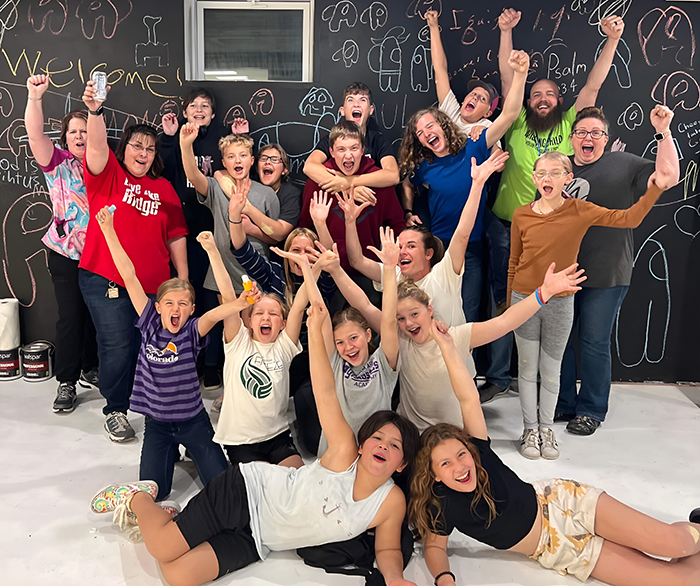Frazee Youth Center feeds kids and their ambitions
News | Published on March 7, 2023 at 3:10pm EST | Author: frazeevergas
0WCI grant to help develop a multi-service climate resilient youth center in Frazee

The West Central Initiative Resiliency Fund has been used to develop a multi-service climate resilient youth center at Cornerstone in Frazee.
By Benjamin Velani
West Central Initiative
Karen Pifher is the interim executive director of CornerStone, the social-corporate arm of the Hornet’s Hive nonprofit located in Frazee, population 1,317. In 2022, Pifher’s organization received $20,000 of $260,000 granted from West Central Initiative’s (WCI) Resiliency Fund to develop a multi-service climate resilient youth center.
“Most of the grant funding built capacity at the youth center, which is now equipped with a Makerspace and full-service kitchen,” said Pifher. “The upper level will include a bistro, coffee shop, performing arts and retail space, and a gift shop.”
“We also used a portion of the funding for community engagement and to develop services to accomplish our mission.”
CornerStone will use these spaces to engage youth in training and workforce skills and to have retail space to build community, support youth entrepreneurism, and sell locally sourced foods. The Makerspace will open in March, and the bistro, coffee shop, and performing arts and retail space will open in June.
“In 2018, Essentia Health received funding from WCI to host listening sessions with students and adults in Frazee,” Pifher said. “We wanted to understand why our students were experiencing mental health issues at a higher rate than other school districts. From those sessions, we learned a primary reason was that outside of school they felt they didn’t have a place to be in our community.”
Students wanted a place to be safe, with people that are loving and supportive, where they could eat good food, and do cool activities, specifically around arts and job training. That was the launch of the vision and development of CornerStone.”
“We’re at $740,000 raised out of the $870,000 we need to open,” Pifher exclaimed. “We’re closing in very quickly on our goal. In a smaller community like Frazee, it’s a big deal to raise that much for a project. In addition to all the financial support the community is giving, they’ve had 250 volunteers this year, with more than 3,000 hours of service to help us get open and running.”
The Resiliency Fund grant allowed Pifher and team to leverage a grant from the University of Minnesota Regional Sustainable Development Partnerships (RSDP) program. They were granted $10,000 to hire Dalila Hussein to develop the details of the entrepreneurial program and how our retail space will work to support youth entrepreneurs.
Hussein is a graduate research assistant at the University of Minnesota, working for the RSDP program. She began her research by conducting a literature review of existing, successful programs for Makerspaces, youth-run businesses, and experience-based programming. The problem Hussein keeps running into is that nobody has created a model for the kind of unique space CornerStone is creating.
The youth center at CornerStone has three components:
The Makerspace: “We’re developing the program specifics,” said Hussein. “This is a space where youth can explore their more artistic side and develop outside of school in a way that isn’t just sports centric.”
Retail and gift shop: “This resonates with the financial sustainability of the project,” said Hussein. “It will offer artisan work from the community, but it’s also going to be space for youth and interns who find and pursue a passion creating works that can be exhibited and sold at the retail shop.”
Bistro and coffee shop: “Youth will run the operations to get real work experience, though always will be supported by a professional manager,” said Hussein. “This is beyond a classroom experience, and more about practical experience with a one-to-one mentorship opportunity at the youth center.”
Pifher has led recent in-person activities at the center. “Just in the last week, we’ve had almost 60 kids come through the building for an activity, and we fed them savory crêpes and told them about the menu, which includes boards of bruschetta, yogurt bowls, and fresh foods. We wanted to show them what they can expect to eat when they come!”
Editor’s note: This story is reprinted courtesy of Benjamin Velani, the Lead for America Climate Fellow at West Central Initiative.

